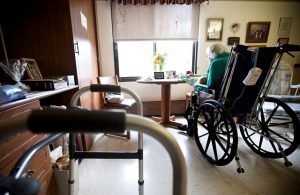
Free Consultation(203) 447-0000

Free Consultation(203) 447-0000
 When the time comes to transition a loved one into a nursing home, choosing the right facility can be a challenging and often highly-stressful experience. With research suggesting that as many as 44 percent of all nursing home residents experience some form of abuse – with an unthinkable 95 percent either experiencing or witnessing neglect – you are right to be cautious in your selection.
When the time comes to transition a loved one into a nursing home, choosing the right facility can be a challenging and often highly-stressful experience. With research suggesting that as many as 44 percent of all nursing home residents experience some form of abuse – with an unthinkable 95 percent either experiencing or witnessing neglect – you are right to be cautious in your selection.
Even after you make your selection, and your elderly friend or family member transitions into their new home, it is critical to maintain regular contact to ensure proper care. In this article, we discuss tips for choosing a nursing home, along with steps you can take to monitor your loved one’s health and well-being while under nursing home care.
When choosing a nursing home for your loved one, first impressions can be important. If your gut tells you that a particular facility isn’t right for your loved one, then you may want to go ahead and move on. Some of the basic things that you may want to consider include:
The Centers for Medicare & Medicaid Services have prepared a guide for choosing a nursing home, which provides additional recommendations.
When visiting nursing homes, don’t be afraid to ask questions. In fact, the more questions you ask, the better. Try to talk to current residents and their family members, as well as the nursing home’s caretakers, administrators, and other staff. See if you can get a list of former residents to speak with as well.
Remember, there are no “bad” or “dumb” questions, and if you are wondering about something, it is likely that someone else has wondered about it as well. Nursing home employees should be more than happy to answer your questions, and they should have no trouble providing the answers you want to hear. If you face resistance or get the runaround, this may be a sign of issues. Speaking with residents and their family members, who may validate your concerns.
Once your elderly friend or family member moves in, it is important to keep tabs on his or her condition and the quality of the nursing home’s care. You should maintain regular communication, and visit in person as often as makes sense for your situation. Some potential issues to watch for include:
These and other issues may all be signs of abuse or neglect.
Contact Berkowitz and Hanna LLC today to schedule a no obligation case evaluation. Call or contact us online to get started.
Berkowitz Hanna
